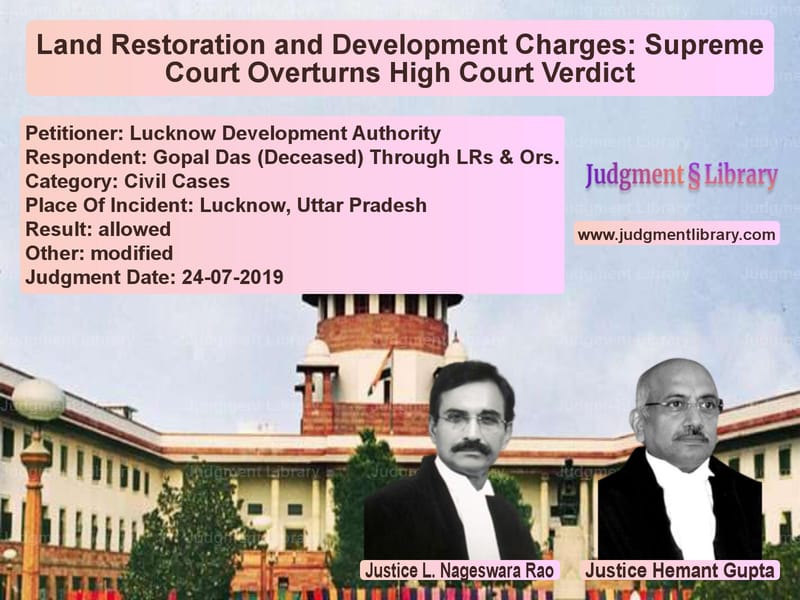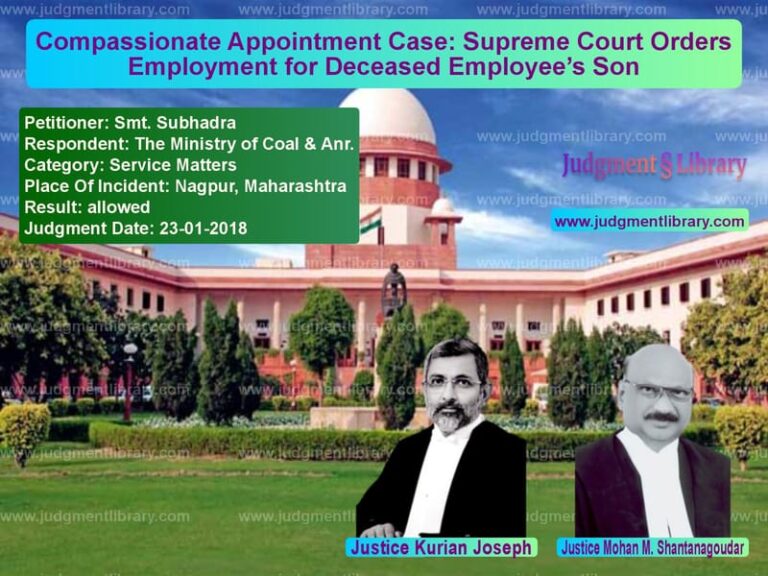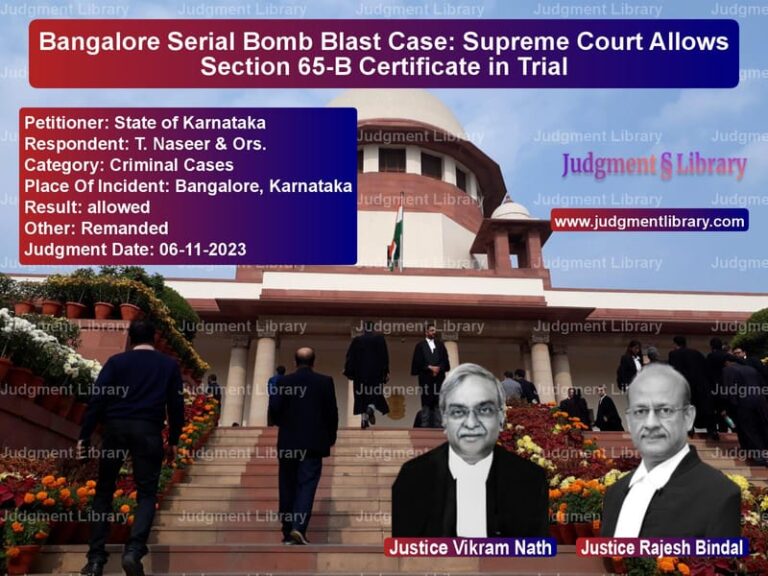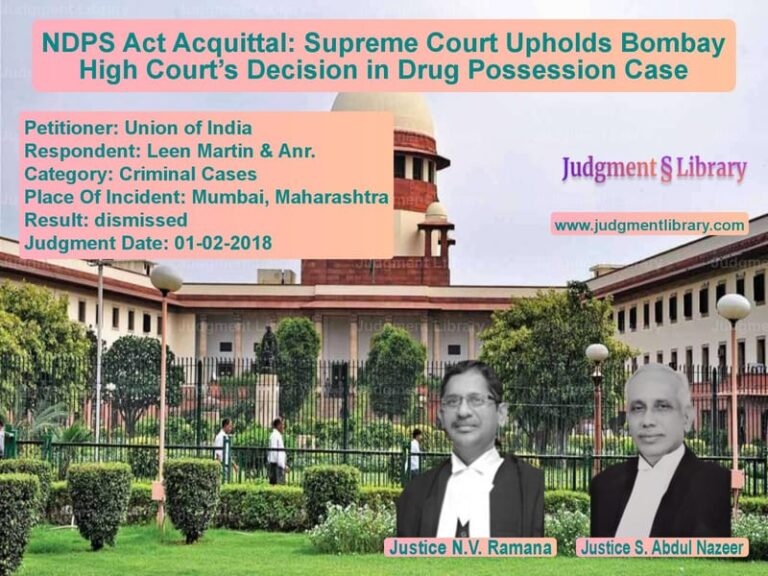Land Restoration and Development Charges: Supreme Court Overturns High Court Verdict
The case of Lucknow Development Authority vs. Gopal Das (Deceased) Through LRs & Ors. revolved around the imposition of development charges on land that was released from acquisition. The Supreme Court had to determine whether the development charges imposed on the respondents for the restoration of their land were justified under the Uttar Pradesh Urban Planning and Development Act, 1973.
The Lucknow Development Authority (LDA) acquired 168.592 hectares of land under the Land Acquisition Act, 1894 for the Sitapur Road City Extension Scheme in 1981. The respondents’ land, measuring 1.200 hectares, was included in this acquisition. However, in 2011, the land was restored to the respondents on payment of acquisition and development charges amounting to Rs.1,57,22,056/-. The respondents challenged this demand, and the Allahabad High Court set aside the imposition of development charges, prompting the present appeal by the LDA.
Arguments of the Petitioner
The Lucknow Development Authority, represented by its legal counsel, contended:
“The development charges are necessary as the land in question was part of a planned scheme where infrastructure such as roads, electricity, water, and sewer lines were provided. The respondents are required to pay their share of these development costs.”
The petitioners further argued:
- The High Court erroneously ruled that there was no development in the vicinity of the respondents’ land.
- The development of an area should be viewed holistically and not in isolation, as urban planning involves comprehensive infrastructural development.
- Under Section 17 of the Uttar Pradesh Urban Planning and Development Act, landowners must bear development charges when seeking restoration of acquired land.
Arguments of the Respondent
The respondents, contesting the demand for development charges, argued:
“The land in question was never developed by the LDA, and no direct benefits from the authority’s infrastructure projects were provided to the respondents. Hence, development charges should not be imposed.”
The respondent further contended:
- The land was not part of any active development plan, and no significant infrastructural work was done in their immediate vicinity.
- The High Court correctly held that development charges could not be levied unless there was clear evidence of benefit to the landowners.
- The respondents should not be treated unfairly compared to other landowners whose land was released without similar financial burdens.
Supreme Court’s Verdict
The Supreme Court, with Justices L. Nageswara Rao and Hemant Gupta presiding, ruled in favor of the Lucknow Development Authority, holding that the High Court’s decision to set aside development charges was legally unsustainable. The Court observed:
“The High Court erred in concluding that there was no development in the vicinity. The LDA has provided essential infrastructure such as roads, water supply, sewerage, and electricity, and the respondents must contribute towards these costs.”
The Court ruled:
- The High Court’s judgment was incorrect in determining that the land was not part of an ongoing development plan.
- The respondents must bear development charges proportionate to the costs incurred by the LDA.
- The specific amount of development charges must be determined through a transparent process, giving the respondents an opportunity to present objections.
- The demand letter dated July 29, 2011, quantifying the development charges, was set aside due to lack of prior notice to the respondents.
Key Takeaways from the Judgment
- Landowners seeking restoration of acquired land under Section 17 of the Uttar Pradesh Urban Planning and Development Act must pay a fair share of development costs.
- Infrastructure development benefits all landowners in an area, justifying the imposition of development charges.
- Authorities must ensure due process by allowing affected landowners to contest and review the calculation of development charges.
- Urban development should be assessed comprehensively rather than in isolated plots.
This ruling reinforces the principle that urban development costs must be fairly distributed among all beneficiaries and that public infrastructure investment must be equitably shared.
Petitioner Name: Lucknow Development Authority.Respondent Name: Gopal Das (Deceased) Through LRs & Ors..Judgment By: Justice L. Nageswara Rao, Justice Hemant Gupta.Place Of Incident: Lucknow, Uttar Pradesh.Judgment Date: 24-07-2019.
Don’t miss out on the full details! Download the complete judgment in PDF format below and gain valuable insights instantly!
Download Judgment: Lucknow Development vs Gopal Das (Deceased) Supreme Court of India Judgment Dated 24-07-2019.pdf
Direct Downlaod Judgment: Direct downlaod this Judgment
See all petitions in Property Disputes
See all petitions in Landlord-Tenant Disputes
See all petitions in Judgment by L. Nageswara Rao
See all petitions in Judgment by Hemant Gupta
See all petitions in allowed
See all petitions in Modified
See all petitions in supreme court of India judgments July 2019
See all petitions in 2019 judgments
See all posts in Civil Cases Category
See all allowed petitions in Civil Cases Category
See all Dismissed petitions in Civil Cases Category
See all partially allowed petitions in Civil Cases Category







